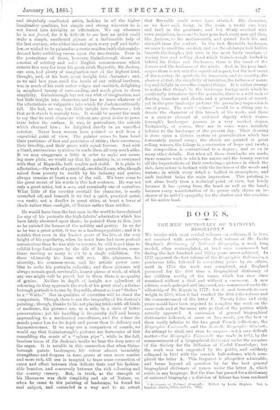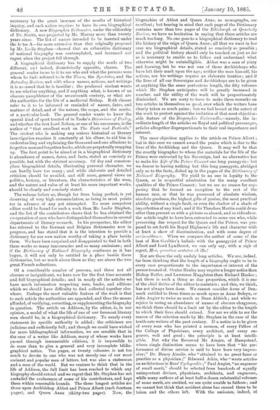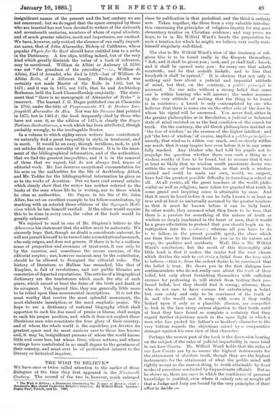B 0 0 K S.
THE NEW DICTIONARY OF NATIONAL BIOGRAPHY.* Ws: receive with most cordial welcome—a welcome, it is true, not unmixed with anxiety—the first volume of Mr. Leslie Stephen's Dictionary 4f ,'lion 11 log nvit y, a work long needed, often coutemplated, at least once commenced, but during the last hundred and thirty years never achieved. In 1747 appeared the first volume of the Biogrophia Britonaica, ponderous folio, followed in succeeding years by six others, until iu the work was completed, and England possessed for the first time a biographical dictionary of her children worthy of the name, which has ever since remained without a rival and without a successor. A new edition, much enlarged and improved, was commenced under the editorship of Dr. Kippis in 1777; but it sank beneath its own weight in 179:3, when it had reached the fifth folio volume and the commencement of the letter F. Twenty folios and sixty years would have been required to c:anplete the work on the same scale and at the same rate as that of the portion which actually appeared. A succession of general biographical dictionaries followed, of more or less merit, yet the best of them vastly inferior to the two great French collections, the Biographic Unicerselle and the Tortrsllc Biographic accluccale. An attempt to rival, and even to surpass—not a very difficult matter—the Biographic Universe/is was made in 181.2, by the commencement of a biographical dictionary under the auspices of the Society for the Diffusion of Useful Knowledge ; but the work was not supported by the public, and suddenly collapsed in 1814 with the seventh half-volume, which completed the letter A. This fragment is altogether admirable, and forms beyond all question by far the best general biographical dictionary of names under the letter A, which exists in any language. But the time has passed for a dictionary of universal biography ; a division of labour has been rendered necessary by the great increase of the results of historical inquiry, and each nation requires to have its own biographical dictionary. A new Biographia Britannia', under the editorship of Dr. Smith, was projected by Mr. Murray more than twenty years since. The list of names intended to be inserted under the letter A—far more extensive than that originally proposed by Mr. Leslie Stephen—showed that an exhaustive dictionary of national biography was contemplated, and increased our regret when the project fell through.
A biographical dictionary has to supply the needs of two different, and indeed, diametrically opposite, classes. The general reader turns to it to see who and what the persons were whom he finds referred to in the Times, the Spectator, and the Saturday Review, and with whose names, actions, and writings it is assumed that he is familiar ; the professed student wants to see whether anything, and if anything what, is known of an obscure pamphleteer of the seventeenth century, or what are the authorities for the life of a mediaeval Bishop. Bath classes refer to it to be informed or reminded of names, dates, and matters of detail, and of the nature, the scope, and the merits, of a particular book. The general reader wants to know the special kind of sport treated of in Tooke's Diversions of Purley, and whether the first Lord Nelson, or one of his successors, is the author of " that excellent work on The Fasts and Festivals." The student who is making any serious historical or literary investigation requires it constantly at his elbow, to aid him in understanding and explaining the thousand-and-one allusions to forgotten men and forgotten books, which are perpetually cropping up. The first point to be aimed at in a biographical dictionary is abundance of names, dates, and facts, stated as concisely as possible, but with the strictest accuracy. Of dry and commonplace biographical details, illustrating personal character, we can hardly have too many ; and while elaborate and detailed criticism should be avoided, and still more, general views on politics, history, or literature, the characteristics of the man, and the nature and value of at least his more important works, should be clearly and concisely stated.
The volume before us, though far from being perfect, is vet deserving of very high commendation, as being in most points far in advance of any yet attempted. No more competent editor could be found for such a work than Mr. Leslie Stephen, and the list of the contributors shows that he has obtained the co-operation of men who have distinguished themselves in several departments of literary research. In his prospectus, the editor has referred to the German and Belgian dictionaries now in progress, and has stated that it is the intention to provide a dictionary for our own nation worthy of taking a place beside them. We have been surprised and disappointed to find in both these works so many inaccuracies and so many omissions ; and if the Dictionary of National Biography continues as it has begun, it will not only be entitled to a place beside these dictionaries, but as much above them as they are above the two great French collections.
Of a considerable number of persons, and these not all obscure or insignificant, we have now for the first time accurate and full biographical details ; and in nearly all the articles we have much information respecting men, books, and editions which we should have difficulty to find collected together elsewhere. Perhaps the most valuable feature of the work is that to each article the authorities are appended, and thus the means afforded, of verifying, correcting, or supplementing the biography in question. The article on Addison, by the editor, is, in our opinion, a model of what the life of one of our foremost literary men should be, in a biographical dictionary. To nearly every statement its specific authority is added ; the criticisms are judicious and sufficiently full ; and though we could have wished for more bibliographical information, we are sensible that in the case of a writer like Addison, many of whose works have passed through innumerable editions, it is impossible to do more than to give a general and very incomplete bibliographical notice. Ten pages, or twenty columns, is not too much to devote to one who was not merely one of our most eminent and popular men of letters, but was also a statesman and a man of the world. Bat we venture to think that in the life of Addison, the fall limit has been reached to which any biography should extend and we regret that Mr. Stephen has not curtailed the exuberance of some of his contributors, and kept them within reasonable bounds. The three longest articles are those upon Archbishop Abbot and Prince Albert (each fourteen pages), and Queen Anne (thirty-two pages). Now, the biographies of Abbot and Queen Anne, as monographs, are excellent ; but bearing in mind that each page of the Dictionary contains more than two pages of the Edinburgh or Quarterly Review, we have no hesitation in saying that these articles are much too long. No one goes to a biographical dictionary to read the history of the reign of Queen Anne ; all that we want in her case are biographical details, stated. as concisely as possible ; and the political history should only be touched on just as far as is necessary to enable us to follow and understand. what otherwise might be unintelligible. Abbot was a man of piety and learning, but he was not one of those Archbishops who have left their mark upon the age ; neither the man himself, his actions, nor his writings require an elaborate treatise ; and if the lives of all our Sovereigns and Archbishops are to be given at anything like the same portentous length, the fifty volumes which Mr. Stephen anticipates will be greatly increased in number, and the utility of the work will be proportionately diminished. We are sorry to have to make these remarks on two articles in themselves so good, over which the writers have clearly taken so much pains ; but we feel bound at the outset of the work to protest against the imitation of that most objectionable feature of the Biographic Universelle,—namely, the inordinate length of the articles on Royal and political personages, articles altogether disproportionate to their real importance and interest.
The same objection applies to the article on Prince Albert ; but in this case we cannot award the praise which is due to the lives of the Archbishop and the Queen. It may well be that the courtly biographer to whom the materials for the life of the Prince were entrusted by his Sovereign, had no alternative but to make his Life of the Prince Consort one long panegyric ; but we demur to having nothing but this long panegyric, abridged only as to the facts, dished up in the pages of the Dictionary of National Biography. We yield to no one in loyalty to the Queen, or in respectful admiration for the many excellent qualities of the Prince Consort ; but we see no reason for supposing that he formed an exception to the rest of the human race, or that he was possessed of absolute wisdom, absolute goodness, the highest gifts of genius, the most practical ability, without a single fault, or even the shadow of a shade of imperfection of any kind ; and if Sir Theodore Martin could do noother than present us with a picture so absurd, and so ridiculous. the article ought to have been entrusted to some one who, while preserving due respect for the Queen and the Prince, was prepared to set forth his Royal Highness's life and character with at least a show of discrimination, and with some degree of vraisemblance. When we compare the author of some of the best of Bon Gaultier's ballads with the panegyrist of Prince Albert and Lord Lyndhurst, we can only say, with a sigh of regret, Heu, quantum mutatus ab illo!
Nor are these the only unduly long articles. We are, indeed, far from thinking that the length of a biography ought to be in every case proportionate to the importance or interest of the person treated of. Orator Henley may require a longer notice than Bishop Butler, and Lawrence Muggleton than Richard Hooker ; but there is such a thing as due proportion, which it is one of the chief duties of the editor to maintain ; and this, we think, has not always been done. We cannot consider Anne of Denmark entitled to three times as much space as Anne Boleyn, or John Angier to twice as much as Dean Aldrich ; and while we rejoice in seeing an abundance of names of obscure clergymen, we think there should be a limit set by the editor to the length to which their lives should extend. Nor are we able to see the reason of the selection made by Mr. Stephen in the case of the tenth-rate writers of the past century. If a notice is to be given of every man who has printed a sermon, of every Fellow of the College of Physicians, every architect, and every engraver, well and good ; the principle is at least intelligible. But why the Reverend Mr Ainger, of Hampstead, whose single distinction seems to have been that "his performance of divine service is said to have been very impressive ;" Dr. Henry Ainslie, who "attained to no great fame or practice as a physician ;" Edmund Aikio, who " wrote articles on architecture in Rees' Cyclopmdia ;" Paul Angier, "an engraver of small merit," should be selected from hundreds of equally unimportant divines, physicians, architects, and engravers,. while many authors of at least half-a-dozen substantial volumes of some merit, are omitted, we are quite unable to fathom ; and we cannot but think that accident alone has caused these to be taken and the others left. With the omission, indeed, of insignificant names of the present and the last century we are not concerned; but we do regret that the space occupied by those who are inserted has not been devoted to writers of the sixteenth and seventeenth centuries, numbers of whom of equal absolute, and of much greater relative, merit and importance, are omitted. We have, however, only noticed the absence of one really important name, that of John Abernethy, Bishop of Caithness, whose popular Physic for the Soul should have entitled him to a niche in the Dictionary. A few slips, trifling indeed, but of the very kind which greatly diminish the value of a book of reference, may be mentioned. William tie Albini or Aubeney (d. 1236) was not " the grandson of the preceding "—i.e., William de Albini, Earl of Arundel, who died in 1221—but of William de Albini Brito, of a different family. Bishop Alcock was certainly not made Master of the Rolls in 1462, but in 1471; and it was in 1475, not 1474, that he and Archbishop Rotheram held the Lord Chancellorship conjointly. The statement that " there is no monograph of Alexander of Hales " is incorrect. The learned J. G. Hager published one at Chemnitz in 1750, under the title of Programmata VI. de Doctore Irrefragabili Ale:ea/Mr° de Ales. Nor was his Summa first printed in 1475, but in 1481-2 ; the book frequently cited by those who have not seen it, as the edition of 1475, is clearly the Super Tertium Sententiarum, a work which has been attributed, though probably wrongly, to the irrefragable Doctor.
In a volume to which eighty-seven writers have contributed, we naturally find a great inequality in style, in treatment, and in merit. It would be an easy, though invidious, task, to pick out articles that are unworthy of the volume. It is in the treatment of the bibliographical information, and of the authorities, that we find the greatest inequalities, and it is in the removal of them that we expect, but do not always find, traces of editorial work. Mr. Lee deserves exceptional commendation for his note on the authorities for the life of Archbishop Abbot, and Mr. Tedder for the bibliographical information he gives us as to the works of Acontius. But we have read several articles which clearly show that the writer has neither referred to the books of the man whose life he is writing, nor to those which he cites as authorities. Dr. Payne, in his life of Dr. John Allen, has set an excellent example to his fellow-contributors, by marking with an asterisk those editions of the Synopsis 3 fedicince which he has himself verified. If the editor would require this to be done in every case, the value of the book would be greatly enhanced.
We rejoiced to read in ono of Mr. Stephen's letters to the Athemeum his statement that the editor must be autocratic. We sincerely hope that, though no doubt a considerate autocrat, he will not permit himself to be turned into a constitutional monarch, who only reigns, and does not govern. If there is to be a uniform sense of proportion and evenness of treatment, it can only be by the exercise, and sometimes the severe exercise, of the editorial sceptre ; nor, however eminent may be the contributor, should he be allowed to disregard the editorial rules. The history of literature, as Hallam has remarked, like that of Empires, is full of revolutions, and our public libraries are cemeteries of departed reputations. The articles of a biographical dictionary are the tombstones which mark the site of each crrave which record at least the dates of the birth and death of its occupant. Yet, beyond this, they are generally little more to be relied upon than monumental inscriptions. It is not the most worthy that receive the most splendid monument, the most elaborate inscription, or the most emphatic praise. We hope to see a dictionary of national biography which shall apportion to each his due meed of praise or blame, shall assign to each his proper position, and while it does not neglect those illustrious men who constitute the true glory of their country, and of whom the whole world is the sepulchre, yet devotes its greatest space and its most anxious care to those less known and, it may be, insignificant persons of whom the world knows little and cares less, but whose lives, whose actions, and whose writings have contributed in no small degree to the greatness of their country, and must ever be of profoundest interest to the literary or historical inquirer.








































 Previous page
Previous page